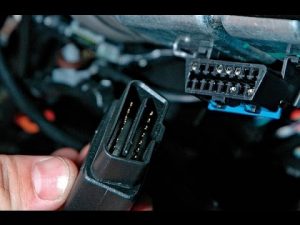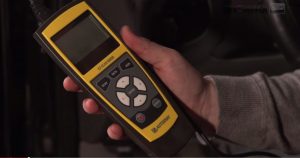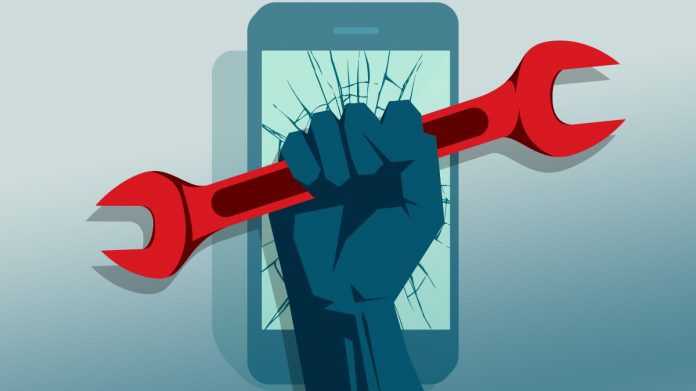It’s a reliable bet that every word you read purveyed by the government-corporate nexus means its opposite. “Contributions” you’re forced to make; the “customer” who can’t say no.
And the Alliance for Automotive Innovation – which seeks to stifle that very thing.
Using fear to get keep people from asking any questions and just doing what they’re told they must to keep themselves saaaaaaaaaaaaaaaaaaaaaaafe.
What is the AAI, then? It is an alliance, all right – of the car cartels, against you. Against innovation and for stagnation.
It is a political lobbying – and marketing – group that serves as a front for most of the major car companies, including General Motors, Ford and Honda – which wants to terrify you into agreeing with them that no one but one of their authorized dealers should be able to work on your car.
That you should not be able to work on your own car, in other words. But those words are never used, of course.
Instead, other words. Scary words.
The AAI funded a TeeVee ad campaign recently through another front, this one styled the Coalition for Safe and Secure Data that says – which shows, graphically – if you don’t agree to this then you’ll be raped by a stranger some dark and stormy night.
“Domestic violence advocates (sic) say a sexual predator could use (your car’s) data to stalk their victims. Pinpoint exactly where you are. Whether you are alone…”
Leaving aside the teeth-aching illiteracy – who advocates domestic violence? – we are left with this despicable narrative that Stranger Danger lurks everywhere – like the Wuflu – and you’d better be so scared of it that you “vote NO” (their all caps) on a ballot measure that would prohibit the car companies from electronically sealing the hood of your car, by denying you – or any independent mechanic – access to the diagnostic data without which you cannot service any modern car.
This is not just a Massachusetts issue, either.
There is a national movement to render every car made the property of the car company that made it – even after they sold it.
By making it so only their authorized dealers can access the data stream necessary to perform almost repair beyond an oil and filter change – because almost everything else requires plugging the car in – not for electricity – but to communicate with its computer.
Some new cars require this plugging in to change the battery; some will not accept a replacement part like a headlight unless the proper coding/flashing rigamarole is followed and to do that, you need to be able to communicate with the car’s computer.
The car companies – hiding behind the AAI – want to deny access to what they consider their computer – and code – which happens to be in your car. Which amounts to denying you functional ownership of your car, since they assert ownership over the data and software which makes it go.
The same is happening with agricultural equipment. John Deere has been trying to assert ownership over the tractors it sold – after the sale – by making it so the tractor is electronically tethered to John Deere dealers.
You want it fixed?
You take it there.
Massachusetts and other states have “right to repair” laws on the books – or pending to be written onto those books – and that’s what the AAI (and John Deere) have been fighting.
This goes back a long way.
All cars made since the mid-1990s have a kind of open-source data port called OBD II, the acronym standing for OnBoard Diagnostics II. No matter the make or model – from the lowliest Hyundai to the haughtiest Mercedes Maybach – they all have the same universal port underneath the steering wheel, which accepts the same universal plug-in scan tool, which anyone can buy – and thus, use. Making it possible for anyone to download and read the “trouble codes” which you must have in order to know what’s wrong with the car and repair it – and then clear the codes once the trouble has been fixed.
Auto parts stores like NAPA and Autozone offer this service, too – for a lot less than a dealership.
OBD II came along after OBDI – which wasn’t universal. Different makes/models had different access methods and if you didn’t have the right scanning tools/access to the codes and what they meant, you couldn’t service the car. You had to take it to a dealer – who was the only one who had the scanning/diagnostic equipment.
There was an uproar over this, which is why OBD II replaced OBD I.
Right-to-repair laws are founded upon the not unreasonable notion that the car companies sold you the car, including whatever code/data it contains.
Now the AAI wants to stifle that innovation and create a kind of vehicular company town in which you may drive the car but you never really own it, even if you paid for it – because they control it.
They hope to do this by using a loophole in existing right-to-repair laws that doesn’t say anything about restricting access to wireless data.
Many cars already have this feature in the form of “concierge” systems (e.g., OnStar) which enable remote access to the car’s computer-controlled systems (e.g., we can unlock your car for you if you lock yourself out). A car so equipped – which is most cars made since the early 2000s – can be remotely disabled in the same way. With drive-by-wire controls – which almost all new cars have already – it is possible to externally control – and to hack – things like throttle and gear selection.
This is the Stranger Danger being touted. But it’s a danger the car companies created – and now want to cure. 
By locking down the data stream.
Or at least, lock anyone but their dealer techs from being able to do anything under the hood.
The fear-sell being used by the AAI is that if you don’t agree to being locked out, the hacker-predator will get you. Like “the virus,” you cannot see it – and it’s probably not there.
But you had better be very afraid of it.
The AAI says “It’s important to note that 99.9 percent of (opposition funding) comes from the Auto Care Association.”
This evil entity represents independent repair shops and parts sellers – those dastardly people who want to offer an alternative to the dealership, thereby increasing competition for your business, which usually means lower cost and better service.
It also means being able to service your car yourself, at no cost (beyond the parts).
Which is your right, since you’re the one who paid for the thing.
The car companies have forgotten this. Perhaps because they’re too busy trying to scare up business for themselves.
. . .
Got a question about cars, Libertarian politics – or anything else? Click on the “ask Eric” link and send ’em in!
If you like what you’ve found here please consider supporting EPautos.
We depend on you to keep the wheels turning!
Our donate button is here.
If you prefer not to use PayPal, our mailing address is:
EPautos
721 Hummingbird Lane SE
Copper Hill, VA 24079
PS: Get an EPautos magnet or sticker or coaster in return for a $20 or more one-time donation or a $10 or more monthly recurring donation. (Please be sure to tell us you want a magnet or sticker or coaster – and also, provide an address, so we know where to mail the thing!)
If you’d like an ear tag – custom made! – just ask and it will be delivered.
My latest eBook is also available for your favorite price – free! Click here. If that fails, email me at EPeters952@yahoo.com and I will send you a copy directly!












I’ve been seeing those commercials for weeks now, didn’t realize that the existing “right to repair” law here in Taxachusetts didn’t cover so-called wireless data. What their scary stalker scenario conveniently omits is that hackers can already take over “your” vehicle if they really want to; the auto industry is giving us a bs straw man argument.
Hi Mike,
Yup. This constant barrage of increasingly hysterical, threatening propaganda is meant for neurotic women and pussified men. Unfortunately, there are now many millions of these sad creatures walking among us. Just look for the Face Diaper.
Eric, you spelled “Stealership” wrong.
Hi Copperhead,
Well, no one’s perfect! And I haven’t got a copy editor (sometimes I miss that). Or a layout person/graphic designer. Or a computer guy. I suppose I could get them, if I became mercenary and “montized” the site – but that’s not my thing. I need to make a living, but that’s not why I live or do what I do here!
I suppose the DoT could mandate that all cars must have an OBDII port and that port must report out all trouble codes that would report via the Wireless interface.
However that would require a government regulation to enforce it and I know you would oppose that.
Clover,
The root problem here is the government, which created the “need” for over-elaborate electronic systems. Being ignorant of how things work, you no doubt are ignorant of the fact that cars reached a kind of apogee of design 30 years ago. Simple throttle body injection and a small computer to run it was sufficient to mitigate almost all of the meaningful (in terms of air quality) emissions coming out of the tailpipe. But rather than concede the job was done, the government doubled (and tripled) down, insisting on further, largely meaningless reductions (fractional reductions) regardless of the cost or the complexity of the systems needed to achieve them.
Beyond using a computer to control fuel/air/spark to improve drive-ability, there is really no need for computers in a car.
As you have pointed out, Eric, virtually all of the critical components, e.g. drive by wire, are have been computerized to meet some fatwa of the god GovCo. The first time I felt that chill of fear down my spine over computerization of cars came decades ago when a woman had her Escalade stolen in St. Pete, Fl. The cops found the car being driven, surrounded it and had On-Star shut it off and “Saved The Day”. Boobus Americanus cheered. The rest of us saw this as the moment that the government could control all travel with the flip of a switch and pictured the smile on the faces of totalitarians.
Hi Mark,
Yup – and the computer needed to control fuel/air/spark can be (was) simple, self-contained and could be adjusted (via a “chip” and so on) by the owner.
The degree of complexity built into modern cars is absurd because there’s no need. Well, no need – from the standpoint of the car’s owner.
While I support right to repair laws, the Massachusetts ballot measure is very poorly written. It’s almost like one of the auto lobbies wrote it to guarantee it will fail.
As far as OBD II being a standard, it only is for certain emissions standards. Being able to use those to help diagnose your car is just a side affect. Most of the other diagnosis functions have to be reverse engineered and is why a better scan tool that can replicate a factory tool costs so much. The scan tool has to either internally or externally switch pinouts of the connector. 7 of the 16 pins are manufacturer specific.
Intellectual property law reforms are way overdue. But unfortunately Congresswoman blow-dry and Senator blow-job are too stupid to realize their ridiculous laws are the primary problem.
Or maybe they do and that’s just fine by them.
When “the media” lobbies hard for copyright extension while also reporting on the goings-on of government you know there’s shenanigans going on. Some Congressman expresses he might not be in favor of eternal copyright. ABC News runs a smear piece on him. Or maybe a newspaper publisher endorses his reelection campaign after the newspaper publishers’ lobby (or the CEO of the conglomerate that owns the newspaper in his district) has a little “chat” with his staffer (“It’d be a shame if your boss lost his reelection bid… your district is in play you know…”).
Google, Apple, Facebook and the rest have an enormous war chest of vaguely written, dubious patents. Mostly to keep out competitors who might have a better solution. When Microsoft bought Nokia’s phone business it wasn’t because they had a great product line, it was to get their patent portfolio. Same thing when Google bought Motorola, then turned around and sold off the different hardware divisions but kept the intellectual property. And because they are getting more tight controls over content delivery they can control those screens in a way Zenith and RCA could only dream of having. Ford, GM and any other car company would love to be able to do what the FAANGs get away with, but their growth and innovation days were back when the patent office actually did something instead of being a room full of file clerks.
How surreal, to create a system that can be hacked, and then claim that such hacking can only be prevented by limiting access to their system, which is exactly the thing hackers are expert at overcoming. Similar in some regard to protecting you from attack with a firearm by limiting who can own one. Which limit is immediately overcome by who? Not the “law abiding”, but the criminal who by definition does not recognize any such limit. Or government, which vows to protect you from theft, all the while being the most successful thief one could imagine. One can successfully navigate much of life by immediately comprehending that whatever “improvement” in your life put forth by government, corporation, bank cartel etc. is exactly the opposite of what they are telling you. They are all sociopathic by their very nature. Your best interest is the very last thing that comes to their mind, if at all.
I’ve been a carb & cable guy since I started riding back in the mid 70’s. Here in my tender 6th decade I decided I wanted a really nice bike and, after asking Eric a question or two, settled on a 2012 H-D Softail Deluxe, which I have already heavily customized (of course, it’s a Harley!).
One of the first things I did was to buy and install a Vance & Hines FP3. It’s a little black box that connects to the bike’s ECU so that I can read all the data, temp, trouble codes, fuel maps, etc. Man oh man, did the dealer ever object! But right out of the box I was able to flash a map that totally eliminated the problem of running rich, a problem the dealer couldn’t fix. And just the other day on a long ride with a pal my check engine light came on, so I pulled over and checked the code to find it was a stuck front brake light switch. I pulled out my tool roll, opened the cover to clean out / unstick the switch, and was back on the road in ten minutes after clearing the code. It’ll be a $16 part that’ll take me half an hour to replace when the time comes. At the dealer it would have been $65 to read the code and $140 to replace the part, and a $50+ fee if I’d had them pick up the bike. No wonder they objected so strongly to me installing the FP3!
It sure isn’t spark-fuel-air simple, and I’m still a bit unsettled by the drive by wire aspect of this bike, but being able to end-run the manufacturer and dealer is a satisfying feeling. Right now I’ve got a very talented buddy taking a look at the actual code. Never hurts to be prepared.
Excellent, Bill!
I love my Mikunis and Keihins, though… things I can get my fumble fingers on and see, which my Neanderthal brain requires in order to process!
Don’t forget the instructive opening scene in the Battlestar Galactica reboot. The Galactica is able to escape the Cylons because it’s the only ship that isn’t “drive by wire.”
right on Eric. there was another episode where a new Lieutenant told Adama that they had to connect all their ships to the AI so they could be more effective in the coming battle. Adama said no way, the kid did it anyway and of course the Cylons hacked their AI and almost lost the battle because of it. The writers of that show were ahead of their time.
In my biz, we have 12 employees and every IT person say we must connect all via a server, cloud, etc………. to be more efficient. NO way, I am holding out forever if possible. My reasoning is if we lose one laptap (stolen, lost) we only lose a fraction of our info. Maybe I’m wrong and am losing biz cause of it. Don’t care.
And I still keep paper books of our info. It may payoff someday, maybe not. Cheap insurance.
What if the stalking sexual predator works at the authorized dealership? I am still in the same position of being stalked and raped with my car as the willing accomplice as I would be if I took it to Joe’s Garage.
Biggest scam ever, really. They created this so-called problem by making cars so wired that this would – theoretically, I guess – be possible. Then they pretend they had nothing to do with how we got here in the first place and present us with a “solution,” which, coincidentally, benefits them big time. If they really cared about my stalking and raping, maybe offer me the chance to buy an unhackable car.
Amy May, that would be VERY difficult. Due to the complexity involved, and the fact that software development VERY seldom builds security in from the very start, very little is unhackable. But its a VERY bad idea to make access wireless. That opens up an entirely different set of security problems. Its akin to the on coming train wreck that is the IOT (Internet of Things). This will give you a brief over view if you are interested.
https://www.zdnet.com/article/iot-security-is-bad-its-time-to-take-a-different-approach/
Well-said, Amy!
Someone could steal my ’76 TA but it can’t be hacked. Hacking became possible when cars began to be fitted with things like “concierge” systems (e.g., OnStar) which open up wireless/remote access to the car’s computer-controlled systems (e.g., we can unlock your car for you, remotely!). They can also remotely disable your car in the same way. With drive-by-wire controls, it is possible to externally control things like throttle and gear selection.
Lol. I saw that in some espionage thriller. The CIA locked them in and drove the car off a bridge. Since I’m not stealing state secrets, I figure I’m pretty safe from that, as I am from rapey stalking. I occasionally use a scary parking garage downtown, but this worry really doesn’t take up much of my time.
So far, it seems like those things you mentioned are options. I don’t have any of that stuff and don’t really want or need it. Interesting that they want to lock us all out of our cars for those that do have it. I wonder why. (Don’t answer that. I was being rhetorical.)
But we have encountered this wired-in, keep you out phenomenon already. My husband got me this cool little gadget that you hook to the headlight lever to open the garage door. Just flash the brights and the door opens. No need to keep a fob around and change its batteries all the time. It worked fine on my 2006 Mustang, as it does on his newer F150, the Harley and our 90s pickup. But my 2016 Mustang rejected it outright. He got under the hood and couldn’t make heads or tails of the wiring and the connectivity. The lights aren’t a separate system anymore and he thinks putting it on there will disrupt the whole system and the lights won’t work. There was really no good reason for Ford to make the headlights more complicated in those 10 years, but they did. I guess it has something to do with how I can set them to auto. Is there a light/dark sensor in there now? I doubt we could even replace the headlight ourselves if necessary.
Hi Amy,
All of us should maintain awareness of our surroundings at all times – not just women. Look around, be watchful of things that seem out of place and be ready to act if something ugly begins to develop. This alone will likely reduce your chances of being attacked immensely.
Everyone who can – male or female – ought to carry a gun. In these times especially. Mace is better than nothing. But better something more persuasive.
everything is becoming networked on the car’s internal network. I don’t know if ford went full BMW with headlamps but that could be the case where they are on the car’s network. I kind of doubt Ford would go that far because it would simply anger mustang faithful with no real bottom line improvement. Auto headlights just require a light sensor on the dash like in my ’12. Nothing beyond a few pennies for that.
But anyway regardless of how they are wired the standard bulbs get voltage to required pins for high or low beam. Those pins could always be tapped right in the bulb plug.
Totally. What a hilarious statement….”…sexual predators can hack your data”… you mean…police?
Like the automakers could somehow keep people from stealing data from their vehicles…….. it’s not even a good argument to begin with. Most large companies have the worst security of all.
Computer code should be like anything else on a car that you can customize. Don’t like the wheels, change them out, don’t like the radio, change it out. Don’t like the computer code? Hmmmm, not so much. There is no reason why you shouldn’t be able to add, delete, alter or upgrade the software. There should be a a car computer code culture. It’s odd that there really isn’t.
Older VW group vehicles had VAG-COM software for tuning:
https://en.wikipedia.org/wiki/VAG-COM
There are also lots of diesel “delete kits” that involve flashing the ECM to ignore the DEF tank. They generally aren’t well known because a lot of the software is covered by copyright and patent restrictions and the developers didn’t reverse engineer the code, they just decompiled and modified as needed. None of these guys has the lawyer power of Ford or GM so they keep it quiet and under the radar.
One thing that will probably break this stuff is when manufacturers start putting encryption into the microprocessor or flash memory controller. Unsigned software won’t load, and “untrusted” machines won’t connect. This is what Apple is doing today with their T2 security chip, but it will get cheap enough to implement on an ECM soon enough. This will probably stop the chip tuners, at least after the manufacturers quash all the bugs that the tuners will inevitably find. But I imagine by then most people will be building purpose built track day cars and strictly off-road vehicles and letting the highway stuff alone, especially after law and order VP Cameltoe cracks down on all illegal activity, because a guilty verdict is a guilty verdict, no matter how trivial.
Encryption is nice, but its hardly fool proof. There is an entire section of hobby/hacker types that specialize in breaking various types of crypto. Thats why the best crypto is whats known as open source. The more eyes on the code the better. The console makers tried encryption several generations back. It cost them a great deal, and was broken less than a month after the hardware hit the market. Its an endless arms race.
Yea, but they’re going to waste time and resources on protecting their “intellectual property” because they feel it necessary to get an ROI on all those pencil-necked geeks’ labor. Besides, isn’t about when it gets hacked, it’s that they can possibly defend their copyright and patent against a young upstart “stealing” their code.
Lawyers, all the way down.
Hi RK,
Everything rots from the head down. I’d say 80 percent (probably 90 percent) of the computing power in new cars is unnecessary. As I have written about many times previously, cars made in the mid-late ’90s/early 2000s were (and still are) as or even more reliable than the new cars, easier to service and “run” better. I mean cars with TBI/PFI engines and transmissions with 4-6 gears (one OD, not several) and without LCD touchscreens, drive-by-wire controls, body control modules and “advanced” safety “assists.”
I think the problem, fundamentally, is that within the template of government regs there is little room anymore for major advancement and so stasis – and reliance on gadgets and gimmicks to make cars “new.”
Eric:
I believe you may be one of the last journalists on earth with a genuine desire to uncover the truth. Bravo to you.
Thanks, Mister!
I often feel eerie. I’ve been around long enough now – as a working journalist – to have personally witnessed the sea change in what was once a generally honest profession. In my corner of it, the people – mostly men – who wrote about cars and covered the doings of the car business were both diligent and knowledgeable about cars, the latter being especially important if you want to cover cars and the car business with a degree of intelligence. They were also people who, in the main, loved cars and driving – which meant they were more sensitive to attacks on both.
That began to change very noticeable in the early 2000s as “influencers” and SJW types began to replace the gearheads. Many of these knew nothing about cars – or motorcycles. Herewith a I relate a True Story:
Circa 2002 I happened to be in NYC attending the annual auto show at the Javits Center downtown. I met a guy who had been sent there by the Wall Street Journal to cover it for them. Young kid, probably 27 or so. He chatted me up and began to ask me about how I got into writing about motorcycles, which I also sometimes do. Then he explained he wanted to write about them. I asked him about his bikes, which ones did he own? He didn’t own any. He had never ridden a motorcycle. Yet he wanted to write about them.
Another True Story:
Warren Brown – who was The Washington Post’s car writer until recently, was previously their business writer. And he was a good business writer. In the mid-1990s, when I began writing about cars professionally, Brown was assigned to write new car reviews for The Post. Porsche sent him a new 911 to test drive. But he could not drive it. Because Warren didn’t know how to drive stick. He was in his mid-50s at this time.
I’ve got dozens like this.
Generic “journalists.”
Like asking the proctologist to have a look at an earache because he’s a doctor who deals with holes, right?
They could send him to cover the opening of a new lube shop…..
If John Deere actually made the mistake of effectively taking back what they sold to someone, or control of, wouldn’t that put them out of business fairly quickly? Don’t they have competitors who don’t do this?
There are always old/used tractors.
A shocking video has just been released on TikTok of a group of young people (totally drunk) racing down the highway in a Tesla. No driver behind the wheel. The car is now the designated driver. What could go wrong??
Eric, you have stated many times that Tesla has been trying to cover itself by stating that the driver must be in control of the vehicle during autopilot control mode. In reality drivers are sleeping or not paying attention to the road at all. In this example, there is no driver behind the wheel.
http://diazhub.com/latest-stories/video-shows-tesla-driving-on-autopilot-as-passengers-drink-and-sing/
This kind of crap makes me very happy to be driving a car in which the most complex factory electronic device is the AM radio.
What they are trying to do is frighten women (who almost entirely do not work on cars) into voting to take away right to repair.
OBD1 doesn’t even require scan tools. If you did a certain ‘dance’ of the controls the light on the dash would blink the code out in a dot dash code.
>OBD1 doesn’t even require scan tools. If you did a certain ‘dance’ of the controls the light on the dash would blink the code out in a dot dash code.
I had an ’83 Celebrity that would blink out trouble codes if you jammed a wire between two specific terminals in the diagnostic connector.